More than a group of friends
Independent fraternities: 'We do as many manly things as possible'
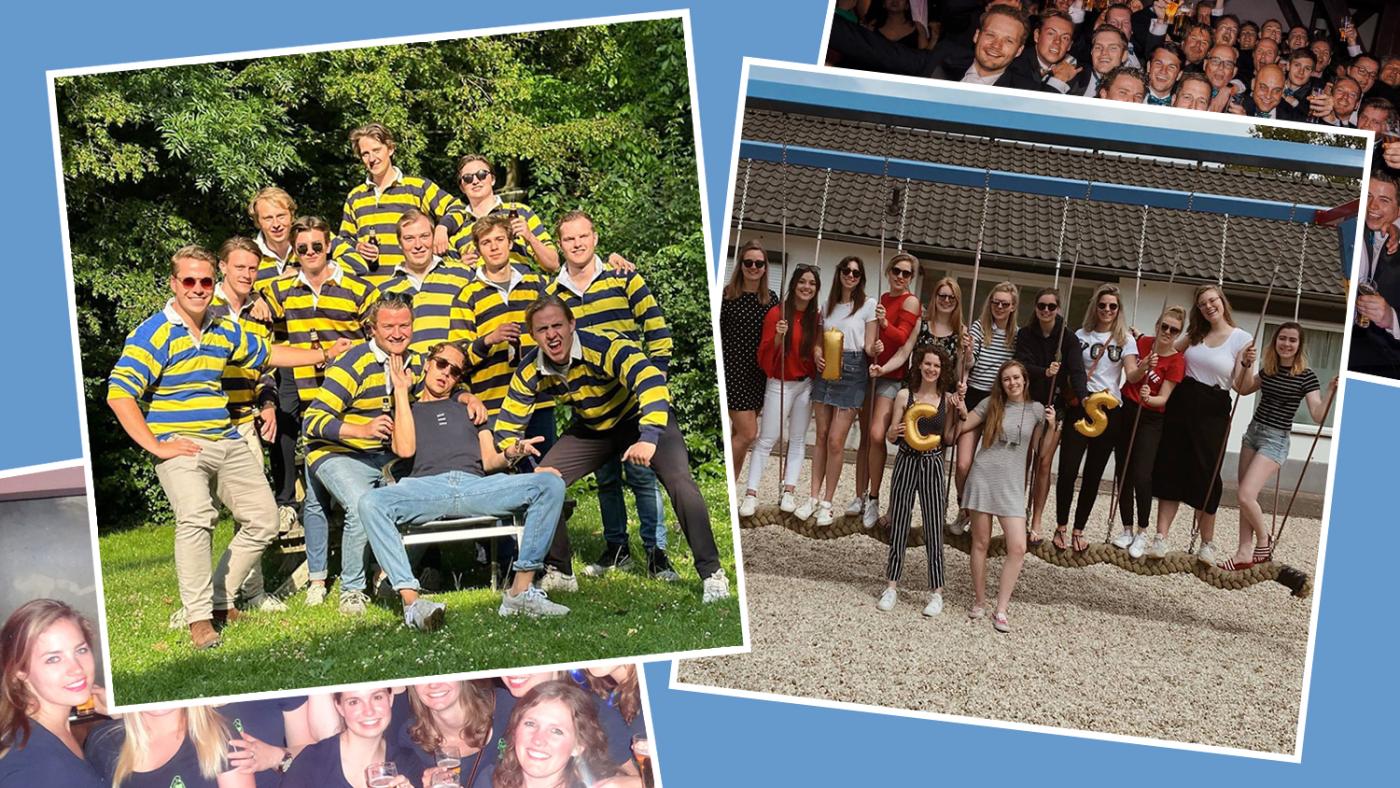
What constitutes student life? For some students, it’s all about traditions and drinking lots of alcohol, while others divide themselves among their friends, a waitressing job, and a sports club. However, an increasing number of students in Utrecht are now adding an independent fraternity or sorority to this mix.
According to Louise, treasurer of ICS, an independent sorority, there are now 28 such groups in the city, a notable increase. “There is a lot of demand for it. More than half of these groups have only been around for a year,” she says.
What is it about these independent groups that are so attractive to students, as opposed to the more official student associations? And how do you join one of them? DUB had a drink with sorority ICS and fraternity Oforkortat to find out.
Culmine Solae: ‘This feels like family’
It’s Tuesday night, 9:00 p.m. A group of twenty women stand together, split into small groups in a little room at Ubica Utrecht. Their hairdos are sharp and their wine glasses are full. Sitting outside on the terrace, under the heat lamps, DUB finds Eva, a student in Creative Business who has been a member of the sorority for three years, and Louise, who studies Intercultural Communication and has been an ICS member for five years. They are excited to talk about the girls of their sorority.
What is an independent fraternity or sorority?
“It’s a sort of mini-student association. Regular associations take on dozens to hundreds of new members each year, but we only accept about four first-year students per year.”
Louise: “In terms of activities and get-togethers, it’s a bit like a student association: every other week, we organise drinks at different pubs around the city. Attendance is mandatory, at least in principle. We also have weekly dinners. And Christmas dinners, Sinterklaas, and New Year’s drinks. A day for prospective members, a date dinner, trips... You name it.”
Except for the small scale, it does sound pretty similar to a student association indeed. Are there any other differences?
Louise: “Most student associations require you to attend events several times a week. With us, you only ‘have’ to go to the bi-weekly drinks. In addition, we don’t practice hazing. Instead, we have an introduction period that mainly revolves around the first-year students getting to know each other better. So, there are fewer obligations compared to a traditional association.”
“Our traditions are not really related to obligations. It’s more about the little things. For example, we do sambuca shots together at every drinks session. And there are recipes we always make together for our dinner nights. Because of that small scale, it feels more like a family.
Louise: “And our members stay active for longer. We currently have about 38 active members out of approximately seventy.”
Thirty-eight active members, that’s a lot of years and ages mixed together. Are you equally close to everyone?
“That varies from member to member, but most close friendships do form around years that are closer to each other.”
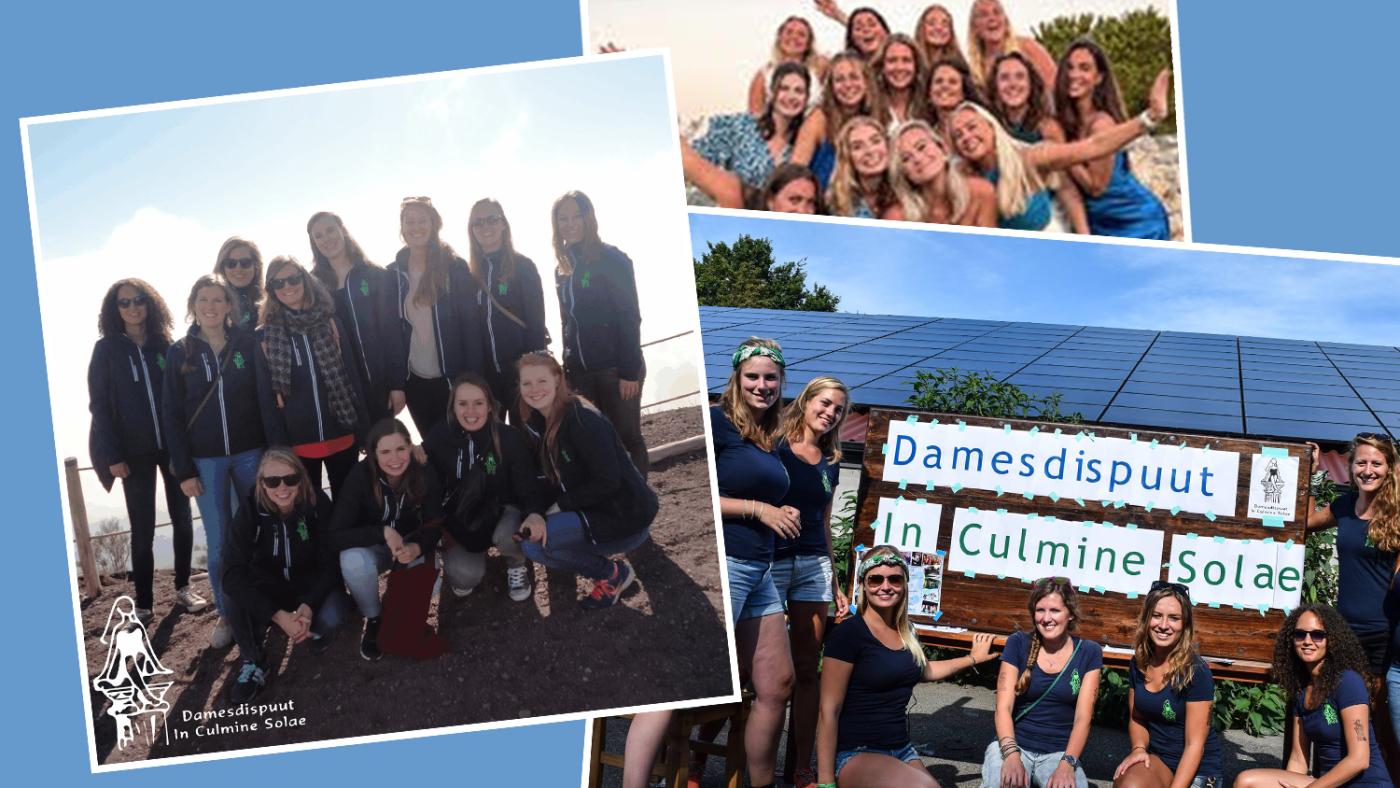
Why do you think more and more students are joining an independent fraternity or sorority?
Louise: “Utrecht is a popular city, there are more students than the associations are able to take. Independent fraternities and sororities are a good alternative.”
“It fills a kind of gap in the market: people who are looking for a group of friends that go on fun activities, but don’t feel like dealing with the overwhelming aspects of association life.”
It was the same with Eva, who joined ICS during Covid. “I was looking for a nice group of friends. I applied for Veritas, but I was not selected. So, I wondered: is there anything else out there? A friend introduced me to independent sororities and I informed myself via Instagram, where these groups advertise themselves.”
You say you were looking for a nice group of friends. What is the added value of a sorority compared to a regular group of friends?
Eva: “The recurring activities and traditions. There’s something magical about that. They also ensure that the group is cohesive and everyone keeps seeing each other. Besides, there is a mix of different ages. Former members sometimes come back to anniversaries, even though they already have a job and children. It’s magical that, only a few years ago, they were still in the same position as we are now.”
You searched for a sorority via Instagram. How did you end up at ICS?
Louise: “Actually, we recruit almost all our members on Instagram. People can sign up via email. Based on that, we chose about sixty girls for the first drinks session. Fewer and fewer people are invited to the drinks that follow, until eventually we are left with a group of about four girls.”
“That’s how it was for me. I went out for drinks with several sororities, but ended up choosing ICS because I felt that I could be myself here. I was lucky that they chose me as well.”
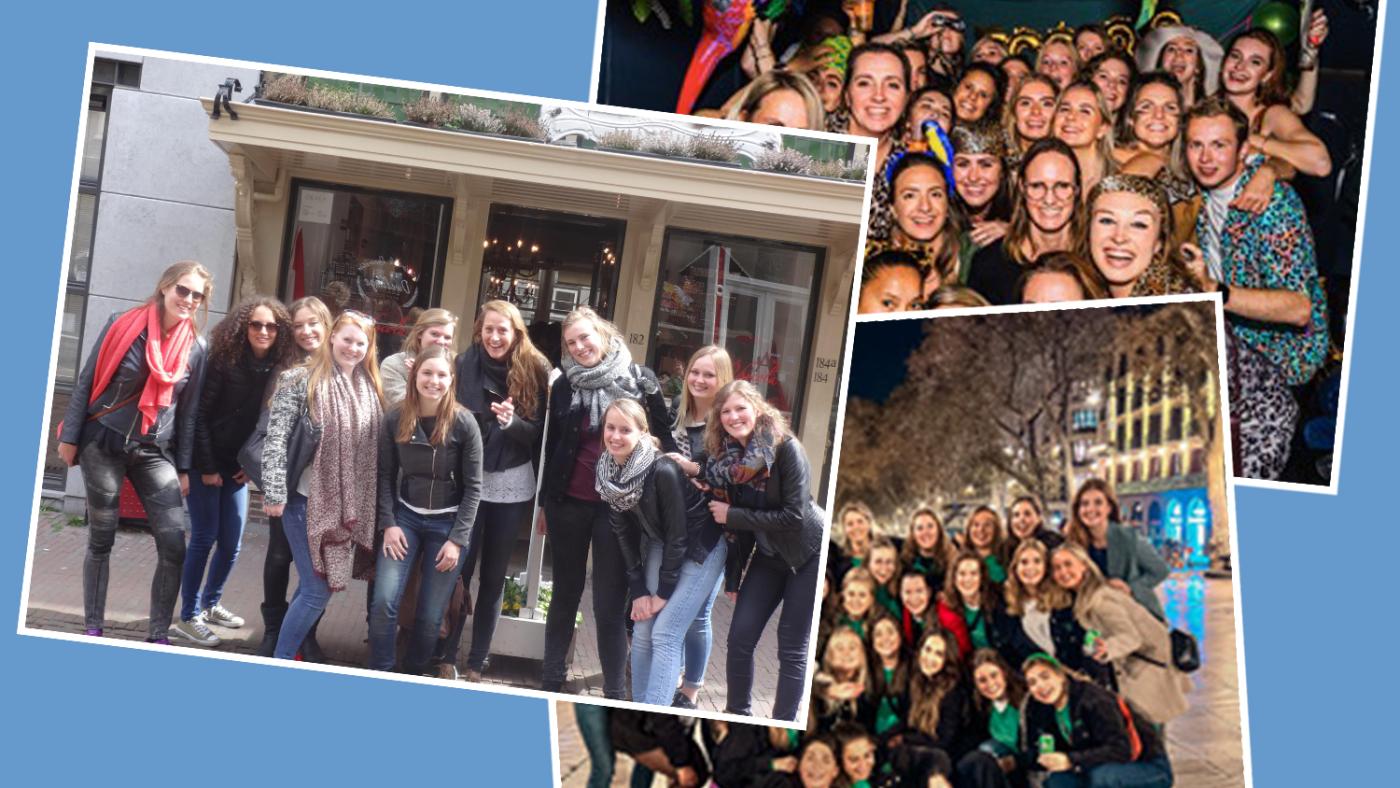
What do you look for in prospective members?
“Nothing specific. The most important thing is that they fit in with the group and that the girls are themselves.”
Eva: “It’s also important for them to be interested in investing in a close-knit group of friends. But we appreciate the fact that we have so many different people in our group.”
Yet this is a women-only group. Why is that?
“That’s what the founders decided and no one has changed it so far. But mixed fraternities exist too, so there are plenty of options for those who are interested in that.
“I deliberately chose a sorority because a girl group seemed more fun to me.”
What does ICS stand for?;
Louise: “It’s Latin. In Culmine Solae: lonely at the top. But we always say: women at the top.”
Eva: “ICS was founded in 1990. This makes us the second oldest sorority in Utrecht.”
How would you describe the group?
“Phew, we’re all so different. But we do share a down-to-earth mindset.”Louise: “Yes, and that family feeling. We exercise and eat together. Some girls talk to each other every day.”
Eva: “I’ve kind of found my best friends here.”
Oforkortat: ‘We throw beer barrels and axes around'
Tuesday, 9:30 pm. Café ‘t Pandje on Nobelstraat is packed with customers. Somewhere in the middle, near the bar, there is a group of guys in blue and yellow striped shirts. They are drinking beer from pitchers and cheerfully shouting at each other.
Vincent and Stijn are sitting by the window. Every now and then, a first-year student walks by with a jug to refill their glasses. “Sorry for the chaos,” Vincent tells the DUB reporter in advance. “Normally we get together at Joost Café, our favorite pub. It’s quieter there.”
Vincent is a fourth-year Oforkortat member and studies Commercial Economics; Stijn is an eighth-year member and works at Eiffel, a consultancy business. Stijn: “If we participate in this interview, can we also post a call?” Vincent: “We want to take on a spring cohort for the first time. So if you’re an interested, man, sign up!”
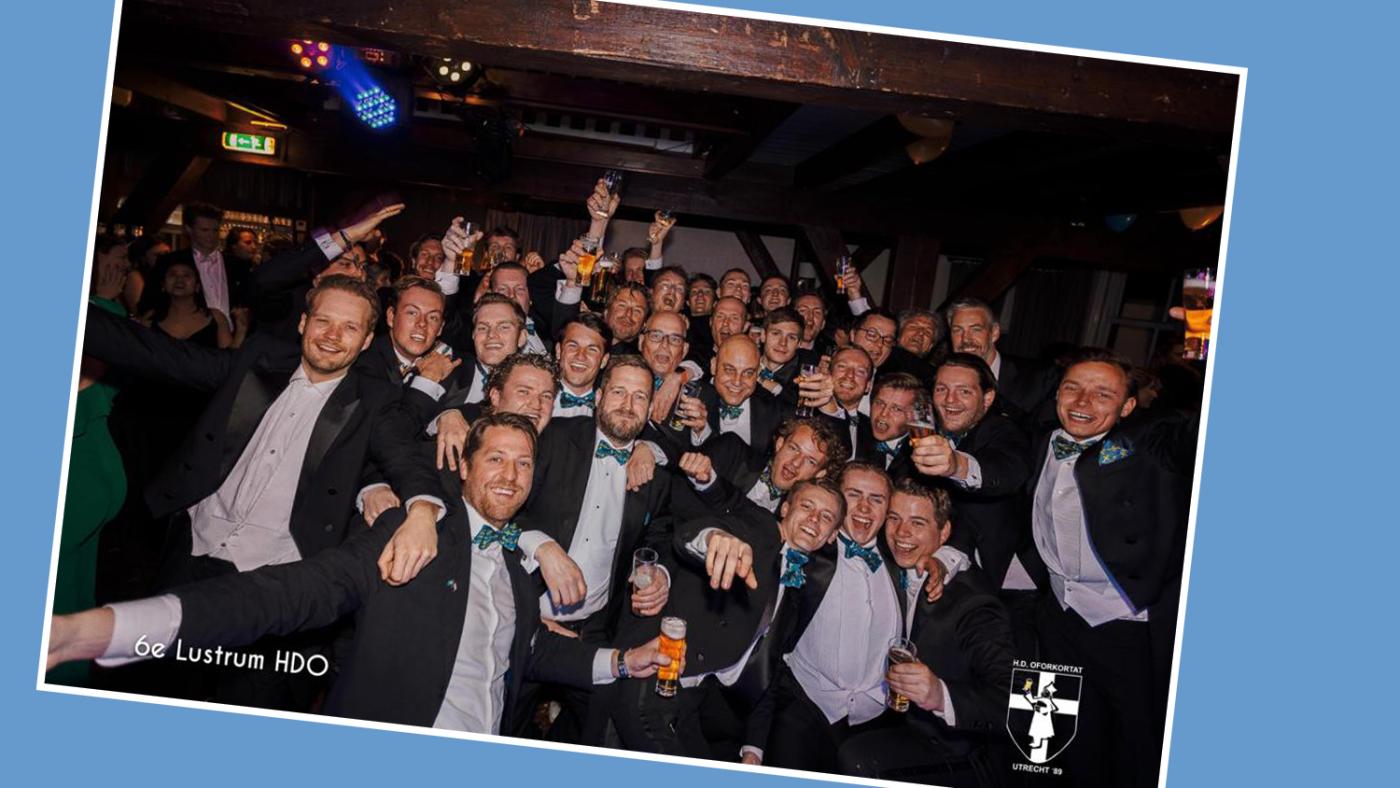
Didn’t you get enough applications this year?
Vincent: “We did. We promote ourselves at Uit. Applications are often done through the grapevine. Promotion via Instagram, which sororities do a lot, has not yet been necessary for us. That’s a good thing, because we men are bad at all of that.”
So why are you looking for new members?
“Let’s just say that we have stretched the introduction period too long. From the summer onwards, we organise weekly get-togethers, spareribs competitions, a BBQ with sororities, and a cigar evening. Traditions that come back every year. If you want to join the fraternity, you have to be present everywhere.”
Stijn: “Well, it’s all just so much fun. But this year, attendance was mandatory for so long that there were many dropouts. In the end, we only had one first-year student left.”
Vincent: “So, readers, do sign up.”
Why should students choose your fraternity?
“First of all, we like to say that we are the oldest fraternity. We’re not sure if it’s true, though. We’ve been around since 1989.
Vincent: “We only take on three or four members each year. That’s how we keep the group close and exclusive.”
Stijn: “As a result, members keep coming back to our events for a long time. Like me! I’m now an eighth-year student, who just has to go back to work tomorrow.”
Vincent: “We use Swedish terminology instead of Latin, like other disputes. That’s where the Vikings come from, and there are a lot of beautiful women in Sweden, according to the fraternity’s founders. Oforkortat means ‘to move forward.’”
Let’s talk about those sweaters. Is it a tradition?
Vincent: “Absolutely. You have to wear it while having drinks.”
Stijn: “Otherwise you will be sent home. No, just kidding.”
Vincent: “But people will laugh at you if you don’t.”
Stijn: “By the way, these are the colours of Sweden: yellow and blue. The chest piece is reinforced by hand. That way, the sweaters won’t break while we’re brawling.”
Brawling?
Vincent: “That’s when you grab the other person by his shirt and you both pull until one of them is on the floor. That’s useful when we can’t agree to disagree.”
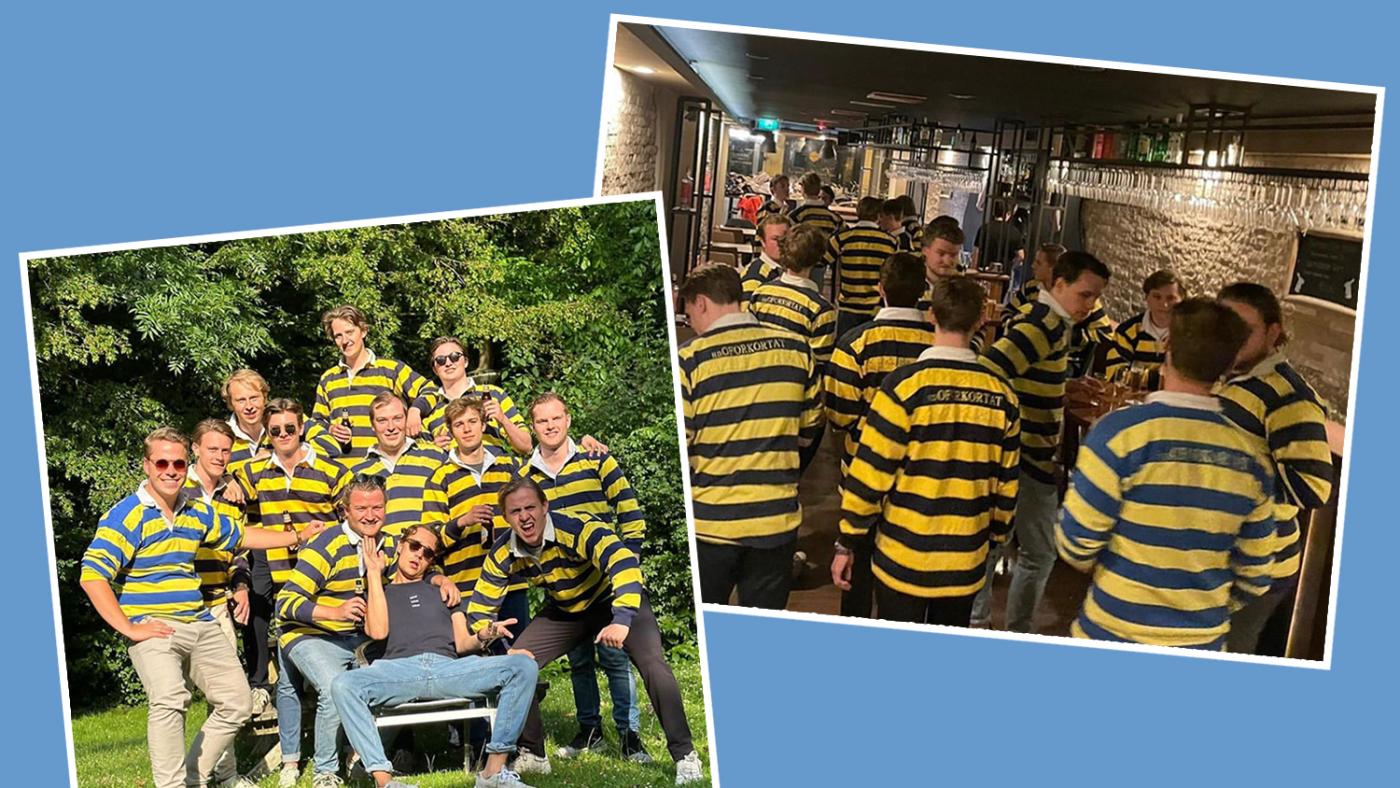
What other traditions do you have?
Vincent: “Greeting older year groups, and addressing each other by our last names.”
Stijn laughs: “And uh, we do as many manly things as possible.”
Manly things? What do you mean?
Stijn: “Yes. Especially on an anniversary trip. We rode in tanks and went shooting. On weekends away, we play ‘The Strongest Man.’ Throwing kegs, tossing logs, casting axes.”
Vincent: “All our traditions follow a certain script. Just like the introduction drinks and the initiation ceremony.”
Stijn: “Because of these traditions, every year group goes through the same thing. That brings all generations together.”
Like sororities, you claim to demand fewer obligations compared to regular associations, and to provide a stronger sense of family. Even so, I’ve just seen a freshman filling up your cup and you just mentioned a lot of obligations. Do you really think your fraternity is non-committal?
Vincent: “Yes, we do. Our get-togethers are bi-weekly. The initiation is shorter and less intense. Maybe not if you compare us to Biton, but that’s a different association anyway. We are certainly more non-committal than Uni, Veri and USC.”
Why do you only accept men?
“That’s what the founders decided.”
Have you ever thought about changing this to be more inclusive?
Vincent: “We have thought about it, but we think it is more important to honour our traditions. We have been a fraternity from the start. This is just how we do it.”
What do you like most about your fraternity?
Stijn: “The family feeling. Members of all years still love this fraternity. Former members often come back and spend a lot of money buying beer for everyone. Then we go crazy.”
“But that familiarity also works in another direction: you can always fall back on a member of the fraternity if you feel low.”